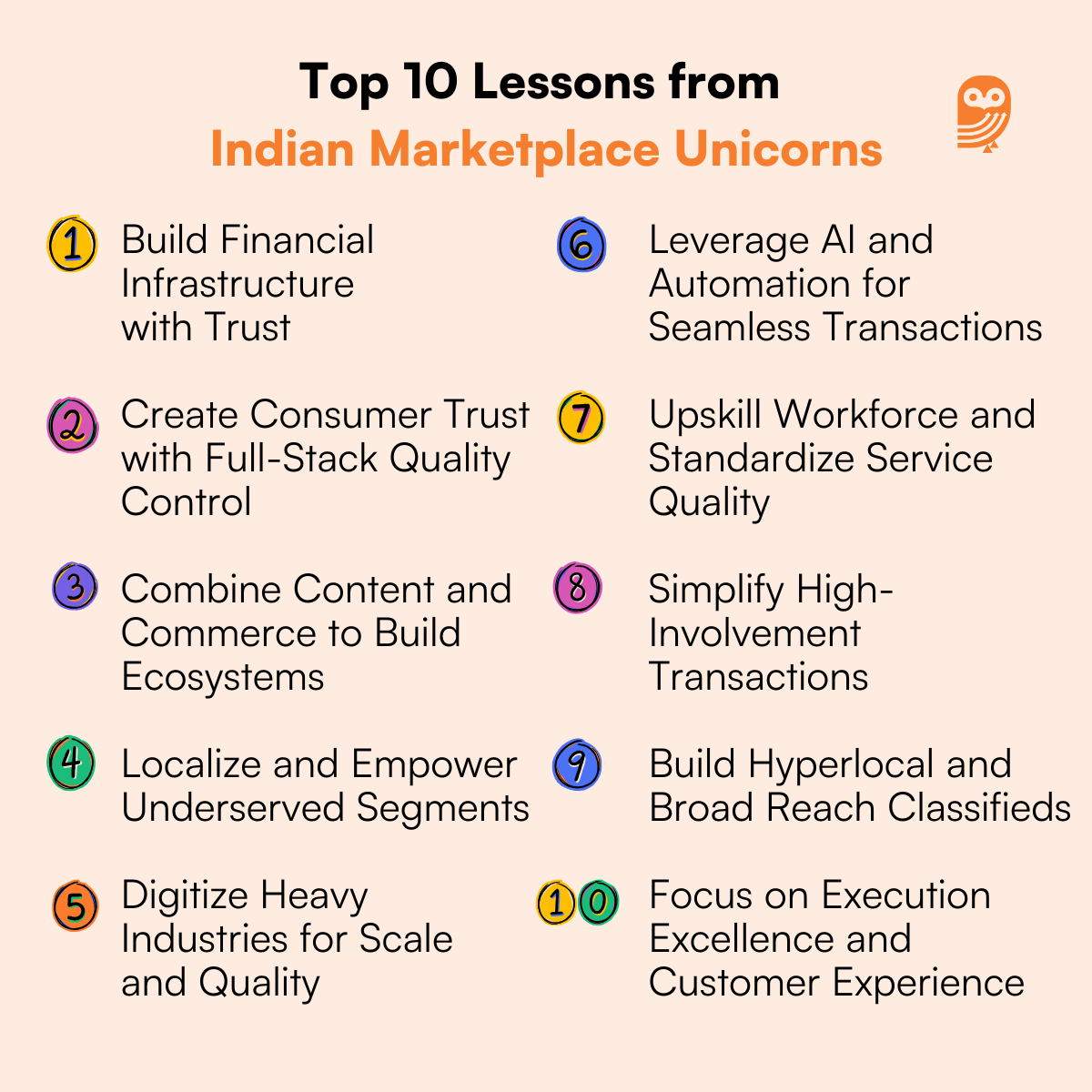10 Impactful Lessons from Indian Marketplace Unicorns
Vivek Goel
June 2, 2025

Table of Contents
Introduction
India’s marketplace unicorns are revolutionizing how business is conducted across a wide range of sectors—spanning financial infrastructure, automotive sales, blue-collar job networks, B2B manufacturing, and on-demand home services. These digital marketplaces are far more than just online platforms; they serve as powerful engines of economic transformation, connecting millions of users with products, services, and opportunities that were once difficult to access at scale.
Navigating the complexities of India’s diverse market—marked by varying regional languages, income levels, and customer behaviors—these unicorns have mastered the art of building deep trust with users, leveraging cutting-edge technology, and relentlessly enhancing the user experience. Their ability to solve real-world problems with innovative, tech-led solutions has enabled them to scale rapidly and sustainably in a highly competitive environment.
In this blog, we delve into 10 impactful lessons drawn from nine leading Indian marketplace unicorns—CredAvenue, Spinny, CarDekho, Apna, Zetwerk, Droom, Urban Company, Cars24, and Quikr—each of which offers unique insights into thriving in India’s dynamic digital economy.
These companies demonstrate how a blend of technology, trust-building, operational excellence, and a deep understanding of local market nuances can lead to breakthrough success. Whether you’re an entrepreneur, investor, or enthusiast looking to understand India’s digital marketplace ecosystem, these lessons offer valuable guidance and inspiration.
1. Build Financial Infrastructure with Trust — CredAvenue
CredAvenue has fundamentally transformed India’s credit ecosystem by creating a transparent, technology-driven marketplace for debt syndication. Unlike typical fintech platforms that focus primarily on consumer-facing products, CredAvenue’s approach targets the backbone of financial markets—building a robust infrastructure that connects lenders, investors, and borrowers in a seamless, efficient manner. Their platform reduces friction and enhances transparency in a traditionally opaque space, thereby fostering trust across all stakeholders.
Key Lesson: In complex financial markets, deep domain expertise combined with a regulatory-first design approach is essential to build scalable and enduring trust. Establishing a foundation that prioritizes transparency and compliance can differentiate a marketplace and enable rapid growth in highly regulated sectors.
2. Create Consumer Trust with Full-Stack Quality Control — Spinny
Spinny revolutionized the highly fragmented and unorganized used-car market in India by creating a customer-first, full-stack marketplace experience. Unlike traditional marketplaces that merely list vehicles, Spinny owns the entire transaction journey—from rigorous vehicle inspections and refurbishments to offering doorstep delivery and buyback guarantees. This end-to-end ownership ensures a consistent quality experience, dramatically improving consumer trust and satisfaction in an otherwise uncertain purchase category.
Key Lesson: Owning quality control across every stage of the customer journey is a critical differentiator, especially for high-involvement purchases. It reassures customers, reduces purchase anxiety, and drives loyalty through consistent, reliable service.
3. Combine Content and Commerce to Build Ecosystems — CarDekho
CarDekho goes beyond simply acting as a classifieds platform for cars; it has built a comprehensive automotive ecosystem by integrating rich content, financing options, and community features. By helping consumers research, compare, and finance vehicles all in one place, CarDekho enhances buyer confidence and decision-making. This holistic model also serves sellers by offering diverse monetization opportunities and higher engagement levels, creating a vibrant marketplace ecosystem.
Key Lesson: Integrating content with commerce creates powerful engagement loops that drive conversions and customer loyalty. Providing educational content alongside transactional options positions a marketplace as a trusted advisor and preferred destination.
4. Localize and Empower Underserved Segments — Apna
Apna addresses the critical challenge of job discovery for India’s vast blue- and grey-collar workforce, a segment often overlooked by traditional platforms. By incorporating vernacular languages, voice capabilities, and community-driven features, Apna creates an inclusive experience tailored to the diverse needs of local communities. This hyperlocal and community-first approach not only empowers underserved workers but also enables organic and rapid scaling by building deep trust within user groups.
Key Lesson: Tailoring products for underserved audiences through localization and community focus drives mass adoption. Meeting users where they are—linguistically and culturally—is crucial for marketplace success in India’s diverse environment.
5. Digitize Heavy Industries for Scale and Quality — Zetwerk
Zetwerk disrupts the traditional B2B manufacturing sector by digitizing procurement and supply chain workflows that were once predominantly offline and fragmented. Its digital marketplace connects businesses with a vetted network of manufacturers and suppliers, enabling greater transparency, quality control, and operational efficiency. By focusing on vertical integration and execution excellence, Zetwerk has created a high-moat marketplace that unlocks value in an unorganized industrial sector often resistant to digital transformation.
Key Lesson: Vertical B2B marketplaces that prioritize execution excellence and quality control can unlock significant barriers to entry, enabling sustained growth in traditionally offline and unorganized industries.

6. Leverage AI and Automation for Seamless Transactions — Droom
Droom has modernized vehicle buying and selling in India by embedding AI-powered vehicle inspections, data-driven pricing models, and contactless delivery options into its marketplace. This not only accelerates the transaction process but also builds transparency, enabling buyers and sellers to transact with confidence. By automating key steps, Droom reduces human errors and operational friction, setting new benchmarks for efficiency in a traditionally cumbersome market.
Key Lesson: Leveraging AI and automation is critical to reducing friction in high-value transactions. Transparent, data-backed processes foster trust and can dramatically improve customer satisfaction and marketplace liquidity.
7. Upskill Workforce and Standardize Service Quality — Urban Company
Urban Company has transformed on-demand home services by professionalizing the workforce and enforcing stringent quality controls. Through comprehensive training programs and technology-enabled quality assurance, they deliver consistent, premium experiences in sectors like cleaning, plumbing, and grooming. This investment in people and processes has created a scalable marketplace model where customer trust and repeat usage thrive.
Key Lesson: Workforce upskilling and rigorous quality control are indispensable for long-term customer loyalty, especially in service marketplaces where experience quality directly impacts brand reputation.
8. Simplify High-Involvement Transactions — Cars24
Cars24 has made selling used cars simpler and faster by introducing instant online quotes, doorstep vehicle pickup, and integrated financing and documentation services. This full-stack approach addresses major pain points in the traditionally complicated process of vehicle resale. By focusing on removing logistical and paperwork hassles through technology, Cars24 has created a significant competitive advantage in the Indian automotive resale market.
Key Lesson: Streamlining logistics and paperwork via technology creates a formidable moat, making complex, high-involvement transactions smooth and repeatable for users.
9. Build Hyperlocal and Broad Reach Classifieds — Quikr
Quikr was a pioneer in bringing classified ads online in India, covering a broad range of categories including jobs, real estate, electronics, and services. Its success lies in balancing wide category offerings with hyperlocal focus, enabling users to quickly find relevant, localized deals and services. By specializing in verticals and capitalizing on first-mover advantage, Quikr has established a dominant position in India’s digital classifieds ecosystem.
Key Lesson: First-mover advantage combined with deep category specialization and hyperlocal targeting can cement marketplace dominance in a fragmented market like India.
10. Focus on Execution Excellence and Customer Experience
What truly unites these marketplace unicorns—from CredAvenue’s fintech infrastructure to Urban Company’s on-demand services—is an unyielding focus on execution excellence and delivering superior customer experiences. Whether it’s through technology, quality control, or community engagement, their success demonstrates that sustainable scale in India’s diverse and complex market requires relentless operational discipline and customer-centricity. These elements enable them to overcome regional, regulatory, and cultural challenges, setting benchmarks for future startups.
Key Lesson: Execution excellence, combined with a laser focus on quality and customer experience, is the backbone of lasting marketplace success in India’s unique environment.
Conclusion
India’s marketplace unicorns are far more than just digital platforms—they are powerful agents of transformation reshaping entire industries by addressing deep-rooted challenges at massive scale. From streamlining financial infrastructure and revolutionizing vehicle transactions to empowering underserved workers and standardizing local services, these companies have demonstrated how innovation, trust, and relentless customer focus can unlock tremendous value in complex markets.
Their journeys offer entrepreneurs a treasure trove of actionable lessons: the importance of building transparent and trustworthy ecosystems, leveraging cutting-edge technology like AI and automation, localizing products for diverse user bases, and maintaining rigorous operational excellence. These lessons highlight that success in India’s marketplace space requires not only visionary ideas but also impeccable execution and a deep understanding of customer needs.
Whether you’re developing a B2B manufacturing network like Zetwerk, creating a seamless auto resale experience like Cars24, or building a hyperlocal services app like Urban Company, the strategies these unicorns have adopted provide tactical insights and inspiration that can guide startups on their path to scale and sustainability.
For entrepreneurs, investors, and business enthusiasts keen to learn more from India’s innovation landscape, exploring these stories will enrich your perspective on what it takes to build enduring marketplace success in one of the world’s most dynamic economies.
👉 Explore more inspiring unicorn stories and learn from India’s top marketplace pioneers at orangeowl.marketing/unicorn-chronicles


